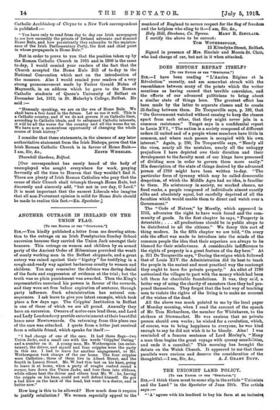DOES HISTORY REPEAT ITSELF P [To TER EDITOR OP TER
"SrEcTAToit.".1 SIR,—I have been reading " L'Ancien Regime et la Revolution" recently, and am somewhat struck with the resemblance between many of the points which the writer mentions as having caused that terrible convulsion, and the efforts of our advanced politicians to bring about a similar state of things here. The greatest effort has been made by the latter to separate classes and to create ill-feeling between them. De Tocqueville says, p. 186, that " the Government watched without ceasing to keep the classes apart from each other, that they might never join in a common resistance." Turgot says in a confidential report to Louis XVI., "The nation is a society composed of different orders ill united and of a people whose members have little in common, and where each person is occupied with his own interest." Again, p. 230, De Tocqueville says, " Nearly all the vices, nearly all the mistakes, nearly all the unhappy prejudices I have depicted owe their duration and their development to the faculty most of our• kings have possessed of dividing men in order to govern them more easily." His description of the state of things desired by the advanced person of 1780 might have been written to-day. "The particular form of tyranny which may be called democratic despotism, of which the Middle Ages had no idea, is familiar to them. No aristocracy in society, no marked classes, no fixed ranks, a people composed of individuals almost exactly alike and absolutely equal, but carefully deprived of all the faculties which would enable them to direct and watch over a Government."
The " Code of Nature," by Morelly, which appeared in 1755, advocates the right to have work found and the com- munity of goods. In the first chapter he says, "Property is detestable ; . . . all productions should be in public shops to be distributed to all the citizens." We fancy this sort of thing modern. In the fifth chapter we are told, "On every side the effort was made to introduce into the minds of the common people the idea that their superiors are always to bo blamed for their misfortunes. A considerable indifference to the rights of property is a great feature of the day here." At p. 311 De Tocqueville says, " During the reigns which followed that of Louis XIV. the Administration did its best to teach the people in the easiest and most practical way the contempt they ought to have for private property." An edict of 1780 authorized the villages to part with the money which had been left them for charitable foundations. It was, they said, a, better way of using the charity of ancestors than they had pro- posed themselves. They forgot that the best way of teaching men to violate the rights of the living is to make no account of the wishes of the dead.
All the above was much pointed to me by the local paper of Monday morning, when I read the account of the speech of Mr. Tom Richardson, the member for Whitehaven, to the strikers at Stowmarket. He was anxious that no private person should own works ; he wished for a revolution, which, of course, was to bring happiness to everyone, he was kind enough to say he did not wish it to be bloody. Alas ! I was reminded of a famous sentence of Lord Mor•ley's, " Many a man thus begins the great voyage with queasy sensibilities, and ends it a cannibal." This morning has brought the debate on the Welsh Church. It appeared to me that these parallels were curious and deserve the consideration of the


















































 Previous page
Previous page